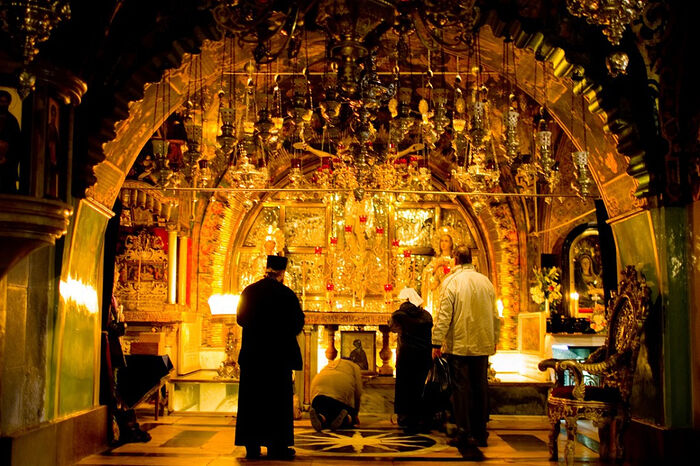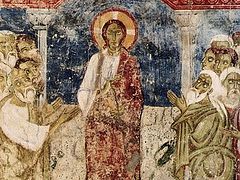We hear comforting words from the mouth of the holy Apostle Paul today: Ye are no more strangers and foreigners, but fellowcitizens with the saints, and of the household of God (Eph. 2:19).
How good it is for a man to be among his people, who love him, who understand him, who sympathize with him, and who share his sorrows and joys! And, on the contrary, how difficult it is among those who are complete strangers to him, hostile, who have not even a shadow of sincere sympathy and compassion for him! Having fallen into such an environment, a man sometimes begins to pine away, and longing for his own people and for his homeland begins to overtake him, and he spiritually suffers and decays like a plant that finds itself in foreign soil. Of course, many people get acclimated to a foreign land, but only when they find their own, sympathetic and understanding people there.
This is also the case with Christians: Although they’re not at home in their earthly life and they are wanderers and strangers for their homeland is in Heaven, how many become more attached to the foreign land than to their homeland, completely forgetting about their Heavenly homeland, living on earth as though this were their eternal home and native land. If many of the best Jews in Babylonian captivity exclaimed in grief: How shall we sing the Lord’s song in a strange land? If I forget thee, O Jerusalem, let my right hand be forgotten (Ps. 136:5-6), then on the contrary, how many were there who preferred the strange land of Babylon to their homeland and didn’t return when the Persian King Cyrus permitted them to do so! Is it not the same among us Christians? Many of us prefer to remain in the spiritual Egypt (cf. Rev. 11:8) of the passions of everyday life, just as before Babylon, the Jews who were led out of Egypt constantly turned their hearts to Egypt (cf. Acts 7:39) with its “meat,” or desired to remain in the spiritual Babylon, despising their homeland?
Christ the Son of God appeared on earth and lived with us that men who have fallen so far away from God might again draw near to Him; to make enemies and strangers to God His beloved sons. He stretched out His arms upon the Cross that all the ends of the earth shall see the salvation of our God (Is. 52:10), to draw all to Himself under the wings of His love, as a bird gathers its young under its wings. He led everyone into the one house of the Father—His Church—and He sat all, the good and the bad, at His one table, offering all to eat His flesh and drink His blood. He not only called them His own, but also wanted everyone to be one with Him, as the branches are one with the vine, as He Himself is one with the Father (Jn. 15:1-5, 17:22, 10:30). What other approach to Him could we expect?
But then man, brought into this unity with God in Christ, again falls away from Him and becomes a complete stranger to Him. How many people there are who bear the name of Christ but are completely alien to Him! What would we say about children who bear the name of their father but have departed from their father, never remembering him, never writing to him about themselves, and moreover are even cold, even hostile to him in their souls? Have not such children become strangers to their father? How many want to be Christians without hardly ever remembering Christ, or remembering Him only by chance, with stray, cold reminiscences?
How many of these children, if they happen to return to their father’s home, find everything in it to be foreign and unusual—the way of life, the customs, the food, the activities! Is it not so for many Christians, who having returned to the shelter of the Mother Church, found the holy Church to no longer be their Mother, the house of their Father, but something completely foreign? Everything in it is strange and unusual for them—those prayers and the Christian way of life, all the thoughts and dispositions that the holy Church wants to fill the souls of its children with. The saints don’t seem familiar, don’t seem close to them, but like infinitely distant people whom it’s completely impossible to approach. And how strange and completely unrelated their lives seem to them! They think that if they began to live a life even slightly similar to the lives of the saints it would be like burying themselves alive, driving themselves to an early grave. What spiritual alienation from God, from Christ, from His saints! And after that, how can they be in the Kingdom of God forever, where everything is for them so foreign, alien, unusual, difficult, and even directly hostile? Wouldn’t they leave it themselves, just as people walk away from Christ in their earthly life, just as people don’t respond to Christ’s call now, though they hear it every day, every hour?
But, many will say, “Have we really completely left Christ; have we become completely alien to the Church? Don’t many continue to call upon Christ, the Mother of God, and fill their homes with prayer?” Yes, but not every prayer, not every visit to the house of the Lord testifies that we are close to God, that we are His and not strangers. After all, we resort to God especially in sorrow and need. Look at those who pray fervently in church. Isn’t it grief and need that prompt them with the words of prayer? But if a child in pain calls for his mother, does he necessarily love her? As long as he’s in pain he needs his mother, but once the pain passes, the child forgets about his mother and sometimes grows up in complete egotism.
Or imagine children not writing to their father and mother for a long time, for years; finally, the parents receive the long-awaited letter, and what’s in it? It’s nothing but a request for money or some other help—nothing else, not a single warm word showing any filial devotion to the father and mother. Would such a letter really comfort a father and mother who love their children? Aren’t our prayers so often like those pesky requests for our everyday needs? Of course, we can’t but lift up prayers, like a man who’s in severe pain can’t but call upon someone for help. But it’s good that we turn to God at least in troubles and needs, testifying at least by this to our memory of Him, that our connection with Him isn’t completely severed yet; even to a share of grateful devotion to Him. We show that we haven’t yet reached the bitterness of the evil demons, who, though they endure terrible suffering, don’t want to turn to God.
But still, it would be much more pleasing if we cried out not only for our everyday needs, but also for spiritual ones—sighing that we’re burdened not only with the misfortunes, sorrows, and sicknesses of everyday life, but also with many sins, as the holy Mother Church teaches us to do in its prayers. These heartfelt cries about the troubles of the soul of a perishing man inspire yet more pity for us in Heaven, they create a bond between us and the inhabitants of Heaven. But still, these cries alone aren’t enough to make us God’s own.
True affinity with God is accomplished through love. It is good when we’re irresistibly drawn to the house of God, as to the cozy shelter of our own home; when we feel the draw to be with God and His saints, as relatives and loved ones feel a deep-rooted need to talk or at least be with one another. All of this is made by habit, as a learned behavior—not immediately; and if it’s not a habit, it can be lost again. If you feel alienated from God and His saints, from His house, you have to steadily and strenuously accustom yourself to communion with Him, as a man who has alienated himself from his home then forces himself to acclimate himself to it again and begins to value and love it more than before.
And how necessary it is to create and preserve this habit of communion with God within ourselves! After all, if we withdraw from Christ and His saints, what kind of society will we have left? Are there not demons and people like them, hardened in malice? How hard it is even for criminals, for whom malice has become like second nature for them, to constantly be around evil criminals in prison, to feel their cold malice, their estrangement, and their hatred upon them—although you would think they might have an affinity for one another. Isn’t the society of demons, which people who have departed from Christ and the holy Mother Church join, much more terrible?
Let us cultivate within ourselves every kind of love and heartfelt attraction to God, to Christ, to His holy Church. Let us give ourselves no rest until Christ, His Church, and the saints are dear to us not only in times of trouble, but also when we have no troubles, when we have nothing to implore, and there remains only to rejoice in the Lord and praise Him. After all, true love is full of sweet bliss and spiritual delights, like the love of the saints and angels for God. This is it how it must be for us in relation to God, that we might not be called Christians only in name, not children of the Church only in name, but that the words of the holy Apostle Paul given at the beginning might be fulfilled in us by very deed: Ye are no more strangers and foreigners, but fellowcitizens with the saints, and of the household of God (Eph. 2:19).




